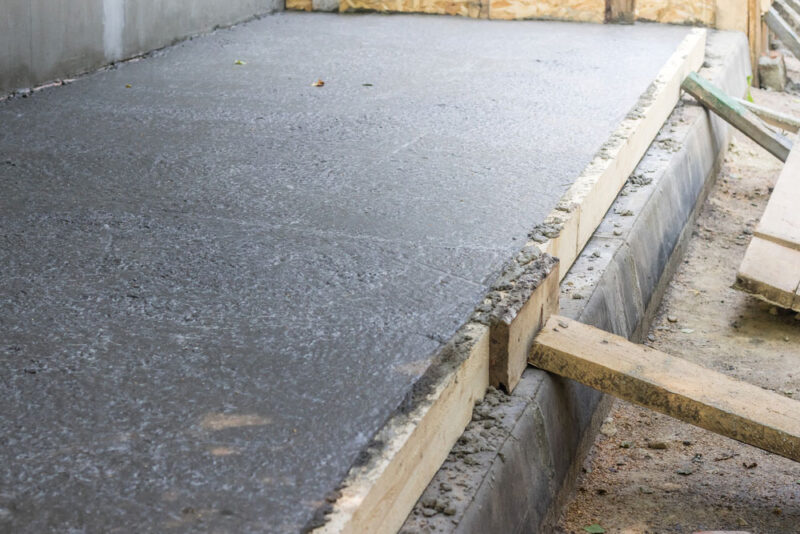Most homes in Texas are built on expansive clay soil. And because it shrinks and swells according to the amount of moisture, it can be a major source of foundation problems. To keep your foundation from getting damaged from clay soil that expands and contracts, Texas homes need to have good drainage and landscape irrigation systems around the property to make sure it has a constant and consistent moisture level throughout the year. In fact, foundation problems are a big concern for Texas homeowners.
The type of foundation being used on a home will depend on the local climate, soil condition, and construction budget. Here are the three main types of slab foundations being used in Texas Homes.

New Slab Pour
#1: A Typical Slab Foundation with Traditional Footings
This is the most common type of slab foundation. A large piece of concrete (called a “footing” or “footer”) acts as the base for the home’s foundation. A steel rebar is placed before the concrete is poured around the perimeter. But sometimes, a gap can form under the poured concrete floor. This can usually be filled with a type of fill material that can level the surface and provide support for the slab. But if the layer isn’t tamped down well enough or has eroded, it will leave an empty void. This is what can cause a slab foundation to crack. As the weight of your home presses down on the foundation, the improperly supported concrete can crack under the pressure.
The best way to fix this problem is to use some type of concrete leveling procedure (such as “slabjacking”). The fill material is injected under the slab foundation and will gradually lift the foundation as it builds up and fills the void. The crack can then be filled and smoothed as your foundation becomes level again.
This type of foundation can also get damaged from erosion. If water erodes the ground under one of your footers, it will cause the foundation to “settle.” A portion of your foundation is sinking at a faster rate, which can add additional strain. The most common symptom of this problem is the presence of cracks in the drywall, especially around doors and windows (which can become hard to open). You may also have cracks across the floor, or it may slope toward the outside.
The best way to stabilize a settling foundation is to use hellical piers. They’re long steel posts that are screwed into the ground next to your foundation. Once they reach stable soil (which can be measured with a pressure gauge), they can be attached to the footer so it doesn’t keep moving.
#2: A Floating Slab Foundation
This type of slab foundation also has a concrete footer, but the exterior walls are built on top of it. The slab floor is poured after this step, so it “floats” or rests on the footing without supporting as much of the structure itself. Like it does with traditional footings, erosion can affect a floating slab foundation. But because the floor is separate from the footer, you may only need to install piers to repair it. A settling footer would only be needed if erosion has occurred under the floating slab, because it would create a void that can cause slab cracks due to the lack of support.
#3: Post-Tension Slab Foundation
This is a kind of monolithic slab foundation that uses cables inside the slab instead of rebar reinforcements, which are pulled tight after the slab has cured. Post-tensioning compresses the concrete and holds the entire slab together as a single piece. This can help to reduce any foundation problems if there’s any settlement or expansion of the soil.
For a post-tension slab to work, the entire building site has to be prepared all at once. This is because the concrete footing and floor are poured together as a single piece. Like any other slab foundation, erosion can be a problem. Because the floor and footers function as a single piece, the repairs will include both piers and concrete leveling. Any changes that are made to a portion of the structure will have to be mirrored on the other side.
If you’re looking for one of the best places for foundation repair in Corpus Christi, be sure to get in touch with Streem Foundation Repair. We have a team of experts who can repair all types of slab foundations, and we would be happy to speak with you about your specific needs.
